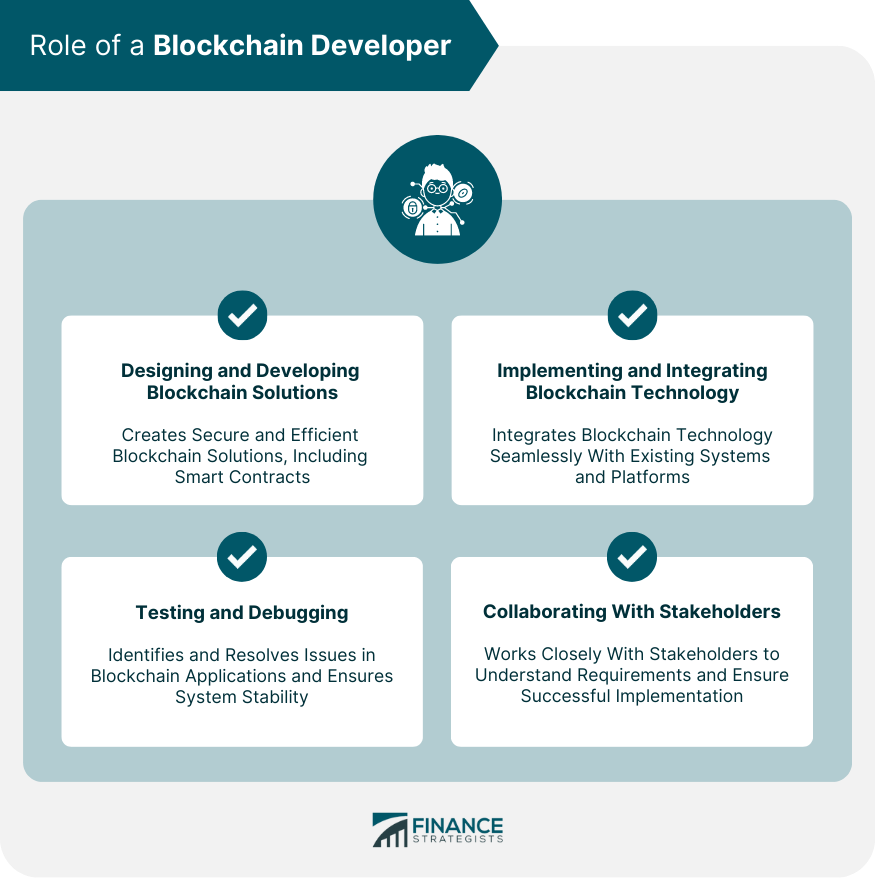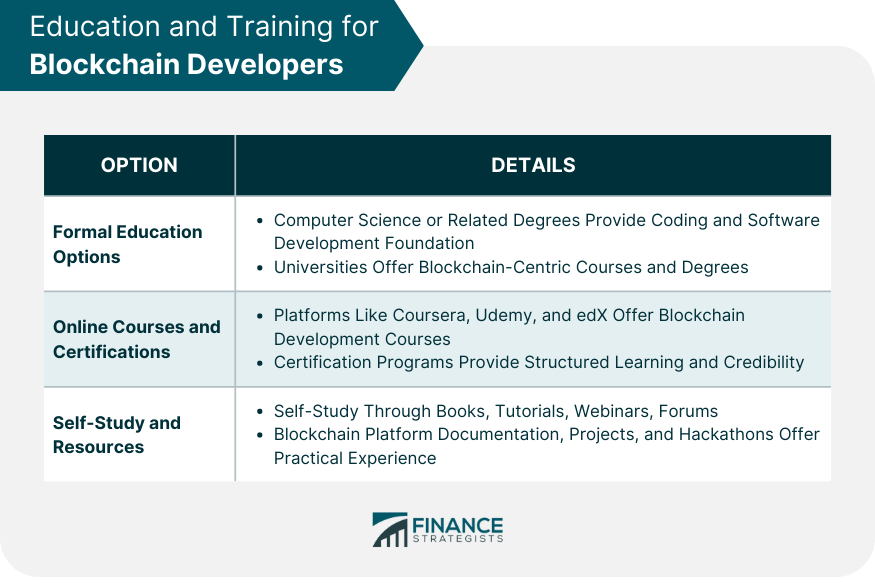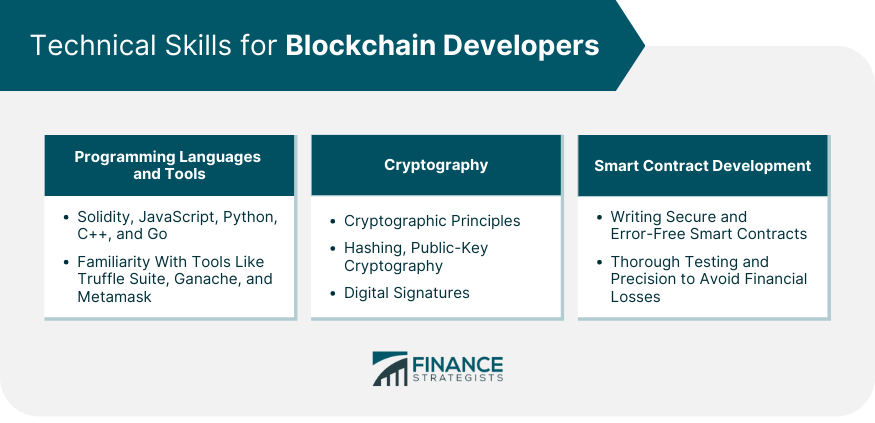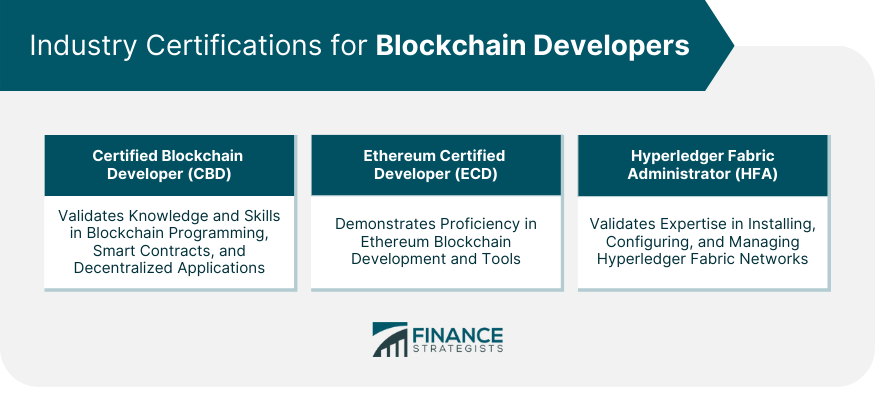A blockchain developer is a type of software developer who specializes in developing applications using blockchain technology. They leverage this revolutionary technology to design and implement digital solutions that provide security, immutability, and decentralization, characteristics inherent in blockchain. These professionals are typically well-versed in various programming languages and have a deep understanding of the principles of cryptography, distributed ledger technology, and smart contracts. Given the burgeoning interest in blockchain applications across various sectors, particularly finance, the demand for skilled blockchain developers is growing exponentially. Blockchain developers play a crucial role in the finance industry, paving the way for innovative financial solutions. As custodians of this nascent technology, they're tasked with creating and implementing digital solutions using blockchain technology. Their job includes developing smart contracts, designing blockchain protocols, and handling the security of the entire network. With the finance industry exploring blockchain's potential for improving processes like transactions, record-keeping, and contracts, the demand for skilled blockchain developers is growing. They are the ones who could potentially transform traditional financial systems into more secure, efficient, and transparent ones. Moreover, they are integral to implementing changes that can bring about decentralization and democratization of financial services. A blockchain developer is responsible for designing and developing blockchain-based solutions that meet specific business requirements. They create smart contracts, design the blockchain architecture, and ensure the system is secure and efficient. Blockchain developers play a crucial role in implementing blockchain technology into existing systems or integrating it with other technologies. They ensure seamless integration and compatibility with other platforms, databases, or applications. As a blockchain developer, one of the key responsibilities is testing and debugging blockchain applications and smart contracts. They identify and resolve any issues or vulnerabilities, ensuring the stability and security of the blockchain system. Blockchain developers work closely with various stakeholders, including business analysts, project managers, and other developers. They collaborate to understand the requirements, translate them into technical specifications, and ensure the successful implementation of blockchain solutions. Most blockchain developers have a background in computer science or a related field, often stemming from a bachelor’s or master’s degree. These formal education programs provide a solid foundation in coding, data structures, algorithms, and software development. However, given the novelty of blockchain technology, many conventional degree programs may not offer specialized blockchain modules. For this, numerous universities worldwide have now introduced blockchain-centric courses and degrees. These programs delve into the depths of blockchain technology, giving students an edge in this niche field. Online learning platforms have emerged as a popular option for aspiring blockchain developers, offering courses tailored to blockchain development. Platforms like Coursera, Udemy, and edX host a variety of courses covering fundamental blockchain concepts, smart contract development, and the creation of decentralized applications. In addition to standalone courses, there are comprehensive certification programs that offer a structured learning path and often end with a certification exam. These certifications can bolster a developer's portfolio and boost their credibility in the job market. Online learning not only provides flexibility but also facilitates learning directly from industry experts and pioneers. Self-study is another viable path for learning blockchain development. The internet is replete with resources—books, tutorials, webinars, blog posts, and forums—that provide a wealth of knowledge on blockchain technology. For those with an existing background in software development, self-study can be an effective way to transition into blockchain development. Key resources include the documentation and guides provided by various blockchain platforms, like Ethereum, which offer an in-depth look at creating smart contracts and building decentralized applications. Participating in blockchain projects and hackathons can also offer practical experience and insights into real-world applications of the technology. To be an effective blockchain developer, proficiency in certain programming languages is essential. Solidity is the primary language for creating smart contracts on Ethereum, the most widely used blockchain platform for developing decentralized applications. Other important languages include JavaScript, Python, C++, and Go. In addition, familiarity with blockchain-specific tools is necessary. These tools can aid in testing, debugging, and deploying blockchain applications. Examples include Truffle Suite, Ganache, and Metamask for Ethereum-based development. Cryptography is a core component of blockchain technology, providing the security and integrity for which blockchain is known. It involves the conversion of data into a format that cannot be understood without a decryption key, thus safeguarding information from unauthorized access. Blockchain developers must understand cryptographic principles and their application in blockchain systems. This understanding includes knowledge of cryptographic hashing, public-key cryptography, and digital signatures. This mastery of cryptography enables developers to create secure and reliable blockchain applications. Smart contracts are self-executing contracts with the terms of the agreement directly written into code. They automatically execute transactions when predefined conditions are met, eliminating the need for a middleman. For blockchain developers, the ability to write smart contracts is an essential skill. This involves not only writing the code but also ensuring it is secure and free of vulnerabilities. Since smart contracts handle valuable assets and cannot be altered once deployed, the stakes are high. Mistakes can lead to significant financial losses, making precision and thorough testing crucial in smart contract development. The Certified Blockchain Developer (CBD) certification is a professional certification for those who wish to demonstrate their knowledge and skills in blockchain technology. This certification validates a professional’s ability to build blockchain-based applications for businesses. It includes competency in blockchain programming, smart contracts, and decentralized applications. The certification exam typically covers a variety of topics, including blockchain fundamentals, blockchain platforms, smart contracts, and the development of decentralized applications. Obtaining this certification can enhance a professional's credibility and open up more job opportunities in the blockchain industry. The Ethereum Certified Developer (ECD) certification is a highly sought-after certification that demonstrates proficiency in Ethereum blockchain development. This certification focuses on the Ethereum platform, including its programming languages, tools, and technologies. Ethereum is one of the most popular platforms for developing decentralized applications and smart contracts. As a result, the demand for developers with expertise in Ethereum is high. Obtaining the ECD certification can significantly boost a developer's career prospects in the blockchain industry. The Hyperledger Fabric Administrator (HFA) certification validates a professional's ability to install, configure, and manage Hyperledger Fabric networks. Hyperledger Fabric is a platform for developing blockchain-based enterprise solutions. It is known for its modularity and versatility, which makes it a popular choice for businesses. The HFA certification covers various aspects of Hyperledger Fabric, including network configuration, chaincode operations, and troubleshooting. This certification can be beneficial for professionals who aspire to work on enterprise-level blockchain projects. Blockchain developers are architects of the technology driving financial innovation, these developers are transforming traditional financial systems, making them more transparent, efficient, and secure. Their responsibilities span creating smart contracts, developing private blockchains, and designing solutions that align with the needs of financial institutions. Their skills are honed through a variety of avenues—formal education, online courses, certifications, and self-learning. The knowledge gained in programming languages, cryptography, and smart contract development equips them to take on the challenges of this ever-evolving field. As blockchain continues to mature, the demand for skilled blockchain developers is projected to soar. These professionals will be at the forefront, driving the adoption of blockchain technology in the financial industry and beyond. Their work will be central to realizing the transformative potential that blockchain technology holds for our financial systems.What Is a Blockchain Developer?
Importance of Blockchain Developers
Role of a Blockchain Developer
Designing and Developing Blockchain Solutions
Implementing and Integrating Blockchain Technology
Testing and Debugging
Collaborating With Stakeholders

Education and Training for Blockchain Developers
Formal Education Options
Online Courses and Certifications
Self-Study and Resources

Technical Skills Required for Blockchain Developers
Programming Languages and Tools
Cryptography
Smart Contract Development

Industry Certifications for Blockchain Developers
Certified Blockchain Developer (CBD)
Ethereum Certified Developer (ECD)
Hyperledger Fabric Administrator (HFA)

Conclusion
Blockchain Developer FAQs
A blockchain developer is a software developer who specializes in creating applications using blockchain technology. They use this technology to design and implement solutions that provide security, transparency, and decentralization.
Blockchain developers need proficiency in various programming languages, a deep understanding of blockchain principles, knowledge of cryptography, and the ability to develop smart contracts. They also need problem-solving skills and the ability to stay updated with the latest technology trends.
Aspiring blockchain developers can start by getting a degree in computer science or a related field. They can then acquire blockchain-specific knowledge through specialized university courses, online courses, certifications, and self-study. Practical experience, such as participating in blockchain projects, can also be beneficial.
Blockchain developers play a crucial role in the financial industry. They work with financial institutions to create blockchain-based solutions that minimize fraud, reduce costs, and improve transaction efficiency. They translate the requirements of these institutions into functional blockchain systems.
The future of blockchain development is promising. As more sectors, particularly the financial industry, recognize the potential of blockchain technology, the demand for skilled blockchain developers is expected to grow. Blockchain could become a standard technology in the finance industry, making a career in blockchain development a potentially rewarding path.
True Tamplin is a published author, public speaker, CEO of UpDigital, and founder of Finance Strategists.
True is a Certified Educator in Personal Finance (CEPF®), author of The Handy Financial Ratios Guide, a member of the Society for Advancing Business Editing and Writing, contributes to his financial education site, Finance Strategists, and has spoken to various financial communities such as the CFA Institute, as well as university students like his Alma mater, Biola University, where he received a bachelor of science in business and data analytics.
To learn more about True, visit his personal website or view his author profiles on Amazon, Nasdaq and Forbes.











